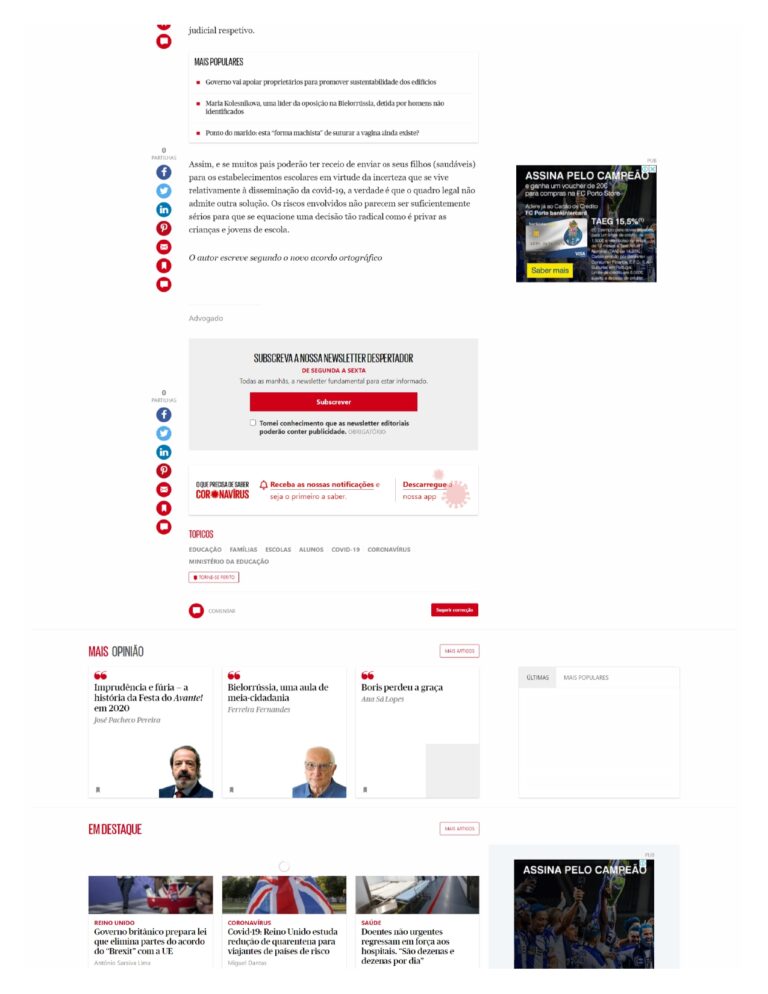Opinion article by our coordinator at Público on 09/07/2029 regarding the question of whether “parents can prevent their children from going to school by claiming risk of contagion”. Read the article on the Público website or the translation and pdf below:
Can parents stop their children from going to school claiming risk of contagion?
While many parents may be afraid to send their (healthy) children to school because of the uncertainty about the spread of covid-19, the legal framework does not allow for any other solution.
Compulsory school classes start next week, and many parents still don’t know if they will (or won’t) allow their children to return to school. The pandemic is far from over and many experts are predicting a second wave in the fall, which fuels fears.
It is tedious to remind parents that looking after their children’s education is their primary responsibility, and a legal obligation. Art. 36 of the Constitution expressly states that “parents have the right and duty to educate and maintain their children”. In turn, a number of other constitutional precepts ensure the right of children and young people to education and training. More than a parental duty, education is seen, in the constitutional text, as a fundamental right of children and young people and an indispensable condition for the formation of tomorrow’s citizens.
Thus, and in this scenario of great uncertainty regarding the risks involved in returning to school, can parents prevent children from attending educational establishments?
The newspaper PÚBLICO recently reported the publication of a Ministry of Education order that provides for an exceptional regime for children who belong to groups at risk. Parents should apply to the school establishment for the application of this scheme, enclosing a medical statement to prove it. Inexplicably, at the time of writing, one week before the start of classes, it is still not known what criteria define the risk groups for children and young people (or if the criteria already defined for the general population apply to them). It is also unknown whether this regime can be applied to cases in which the child does not suffer from any pathology but lives with relatives who are part of a risk group. It is therefore to be expected that many families will encounter difficulties in obtaining the medical declaration, given the lack of definition of criteria. On the verge of the start of school, it is incomprehensible that families are still in this uncertainty.
But in addition to especially vulnerable children and young people, the issue may also arise for those who have no illness or vulnerability but whose parents are nevertheless afraid to send them to school because of the likelihood that they may be infected with covid-19.
In cases where children are not in risk groups – whatever they may be – and do not live with relatives who are in risk groups, parents will have no choice but to ensure their return to school. Attendance at compulsory school is not, as noted, at the parents’ disposal. On the other hand, children and young people seem to be quite resistant to the virus, and the mortality rate before adulthood is very low. The risk associated with infection in these age groups does not, therefore, seem sufficiently relevant to legitimize a decision by parents to deprive their children of the teachings and experiences that only school can provide.
Children who do not show up to class and do not properly justify their absences will, of course, suffer the academic consequences of their absence and, ultimately, failure at the end of the year. On the other hand, not attending school configures a situation of danger in the light of the Protection Law for Children and Young People in Danger that will be reported by schools to the CPCJ (Commissions for the Protection of Children and Young People). If the intervention of the CPCJ does not encourage the return of the child to the school system, the case will be sent to the Public Prosecutor’s Office, which will then initiate the respective judicial process.
Thus, while many parents may be afraid to send their (healthy) children to school because of the uncertainty surrounding the spread of covid-19, the truth is that the legal framework does not allow for any other solution. The risks involved do not seem serious enough to consider such a radical decision as depriving children and young people of school.”

